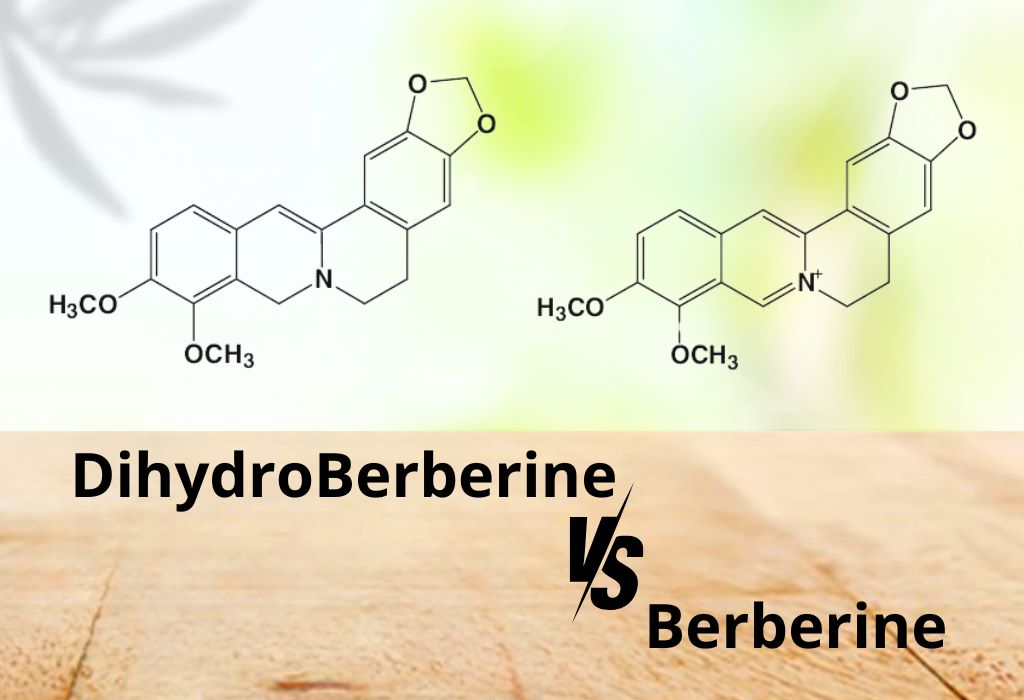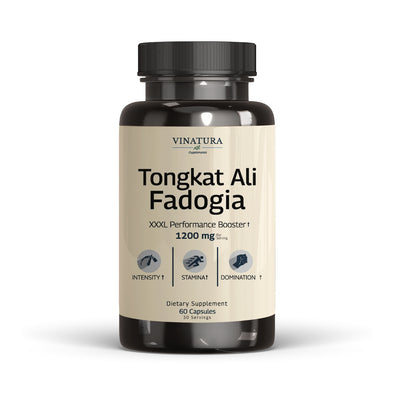
DihydroBerberine Vs Berberine: Which Is Best For Weight Loss?
Many consumers believe that the two supplements, DihydroBerberine and berberine, are the same substance. Although these two compounds have certain similarities, they still provide different components, benefits, and effects for consumers, especially regarding weight loss, where Dihydroberberine may be preferred by some users for its potential effects on wellness. This article explores both supplements to help you understand their differences.
Before exploring further, please read the disclaimer located at the end of this webpage.
Key Takeaways
- Berberine is recognized for its role in promoting general health.
- DihydroBerberine is a derivative of Berberine, known for its prominent weight-loss benefits and other advantages.
- Dihydroberberine vs Berberine both assist users in the weight loss process; however, Dihydroberberine is a derivative of Berberine that is believed to be better absorbed, resulting in higher efficacy.
- DihydroBerberine and Berberine also help control blood sugar and diabetes, with DihydroBerberine showing better results.
About Berberine
What Is Berberine?

Berberine is a potent alkaloid compound commonly found in certain plants like goldenseal, Oregon grape, and barberry. It has been used for centuries, with a long history in traditional medicines from countries like China, India’s Ayurveda, and indigenous American practices. The main component of Berberine has a chemical structure that is considered unique and complex, allowing it to act on various biological pathways in the human body.
When Berberine is ingested, it interacts with an enzyme known as AMP-activated protein kinase (AMPK), which plays a crucial role in regulating energy production and cellular metabolism. By activating this enzyme, Berberine helps the body improve overall health, particularly in supporting weight loss, enhancing cardiovascular health, and more [1].
Berberine Benefits
Berberine is renowned for its remarkable health benefits as a dietary supplement. This compound is recognized for its powerful ability to aid in weight management, stabilize blood sugar levels, and enhance cardiovascular health, mainly when used in the correct dosage and at the right time.
During use, Berberine helps regulate lipid metabolism by supporting the reduction of lipid synthesis while enhancing lipid breakdown through its action on AMPK, thereby lowering cholesterol and triglyceride levels in the blood. Additionally, it is a compound known for improving insulin sensitivity and promoting fat burning.
Numerous studies have shown that Berberine helps users regulate their appetite and reduce fat storage. As a result, this compound facilitates effective and healthy weight loss [2].
Moreover, you may be surprised to learn that Berberine also offers benefits for gut health, reduces inflammation, and even helps prevent memory loss.
About Dihydroberberine
What Is Dihydroberberine?
DihydroBerberine is one of the 17 active metabolites of Berberine, essentially a form of Berberine. It is created when gut bacteria digest Berberine through a reduction reaction.
This compound has been shown in numerous studies to have an absorption capacity that is more than five times higher than that of Berberine [3]. Thanks to its improved structure, DihydroBerberine is less likely to be degraded in the digestive tract, allowing for more effective penetration and absorption by the body, which reduces unwanted digestive side effects commonly associated with berberine use.
Like Berberine, DihydroBerberine also works by activating the AMPK enzyme, thereby helping to deplete cellular energy, stimulate fat breakdown, and reduce fat accumulation, which enhances weight loss effectiveness for users [4].
DihydroBerberine Benefits
As a bioactive form of Berberine, DihydroBerberine provides users with certain benefits similar to those offered by Berberine. This compound is highly effective in assisting with weight loss and improving glucose metabolism. It also has other notable effects, such as anti-inflammatory properties and enhanced cardiovascular health [5].
Specifically, DihydroBerberine is well-regarded for stimulating the fat-breakdown process, promoting the burning of stored fat, and improving energy metabolism [6]. Numerous studies have documented that DihydroBerberine, like Berberine, can reduce appetite and feelings of hunger. This compound helps users better control their caloric intake, thus supporting their weight loss efforts more effectively.
DihydroBerberine Vs Berberine: Which Is Best For Weight Loss?

As mentioned earlier, both DihydroBerberine and Berberine support weight loss. However, their effects on health, absorption, and weight loss efficacy differ.
Since DihydroBerberine is a derivative of Berberine, it is rated higher in terms of absorption. Therefore, DihydroBerberine helps users burn fat more effectively without requiring large doses. Additionally, this compound aids in preventing fat accumulation and reducing blood sugar levels, which helps users manage weight more effectively during weight loss efforts.
On the other hand, Berberine is also known for its weight loss benefits. However, its effect is lower due to slower absorption. To achieve faster results, users typically need to take higher doses, which may lead to digestive side effects [3][6].
DihydroBerberine Vs Berberine: Which Is Better For Diabetes And Blood Sugar?

Both DihydroBerberine and Berberine are known for their blood sugar control and diabetes management benefits [7].
DihydroBerberine enhances insulin sensitivity more effectively, helping improve insulin resistance and allowing better blood sugar control. Additionally, when using DihydroBerberine, blood sugar levels gradually decrease and stabilize without sudden drops, supporting better diabetes management [8].
Berberine also helps regulate blood sugar. However, due to its slower absorption, this compound requires more time and higher doses than DihydroBerberine for visible results.
Is DihydroBerberine Better Than Berberine?
As analyzed in the article, DihydroBerberine is rated higher than Berberine in certain benefits, particularly in terms of absorption and avoiding side effects.
However, choosing the better product, DihydroBerberine or Berberine, depends on your intended use. DihydroBerberine is undoubtedly a more reasonable option for weight loss and blood sugar control, while Berberine offers advantages for more comprehensive health support.
FAQs
How Does DihydroBerberineWork?
DihydroBerberine works similarly to Berberine but is absorbed more efficiently. It primarily boosts the effects of Berberine through the gut, improving absorption and activating mechanisms that help regulate blood sugar, metabolize fat, and enhance insulin function more effectively.
Does DihydroBerberine Cause Symptoms?
Compared to Berberine, DihydroBerberine is known to cause fewer side effects, especially digestive issues. However, to avoid any unwanted effects, it’s recommended to use this compound at appropriate doses and consult healthcare professionals for advice.
Will DihydroBerberine Cause Hypoglycemia (Low Blood Sugar)?
DihydroBerberine helps gradually lower and stabilize blood sugar levels without causing sudden drops. However, it’s essential to monitor blood sugar carefully during use, especially for those already on diabetes medications.
Can DihydroBerberine Be Used In Patients With Hypothyroidism And Hashimoto’s?
DihydroBerberine is considered safe for patients with Hypothyroidism and Hashimoto's disease. However, patients should consult a doctor or follow medical prescriptions to ensure no adverse reactions to this compound.
Conclusion
Both DihydroBerberine and Berberine are highly regarded supplements for improving health, particularly in supporting weight loss. However, the effects of these two compounds vary depending on use. We hope that through this article, you now understand the differences between DihydroBerberine and Berberine and can choose the product that best suits your needs.
References
- [1] Berberine. (n.d.). Retrieved from https://pubchem.ncbi.nlm.nih.gov/compound/2353
- [2] Utami, A. R., Maksum, I. P., & Deawati, Y. (2023). Berberine and Its Study as an Antidiabetic Compound. Retrieved from https://pmc.ncbi.nlm.nih.gov/articles/PMC10376565/
- [3] Feng R;Shou JW;Zhao ZX;He CY;Ma C;Huang M;Fu J;Tan XS;Li XY;Wen BY;Chen X;Yang XY;Ren G;Lin Y;Chen Y;You XF;Wang Y;Jiang JD; (n.d.). Transforming berberine into its intestine-absorbable form by the gut microbiota. Retrieved from https://pubmed.ncbi.nlm.nih.gov/26174047/
- [4] Turner N;Li JY;Gosby A;To SW;Cheng Z;Miyoshi H;Taketo MM;Cooney GJ;Kraegen EW;James DE;Hu LH;Li J;Ye JM; (n.d.). Berberine and its more biologically available derivative, dihydroberberine, inhibit mitochondrial respiratory complex I: a mechanism for the action of berberine to activate AMP-activated protein kinase and improve insulin action. Retrieved from https://pubmed.ncbi.nlm.nih.gov/18285556/
- [5] Author links open overlay panelLihua Tan a 1, a, 1, b, c, f, … Shi, H. (2019). Dihydroberberine, a hydrogenated derivative of berberine firstly identified in Phellodendri Chinese Cortex, exerts anti-inflammatory effect via dual modulation of NF-κB and MAPK signaling pathways. Retrieved from https://www.sciencedirect.com/science/article/abs/pii/S156757691930671X
- [6] Moon, J. M., Ratliff, K. M., Hagele, A. M., Stecker, R. A., Mumford, P. W., & Kerksick, C. M. (2021). Absorption Kinetics of Berberine and Dihydroberberine and Their Impact on Glycemia: A Randomized, Controlled, Crossover Pilot Trial. Retrieved from https://pmc.ncbi.nlm.nih.gov/articles/PMC8746601/
- [7] Cheng Z;Chen AF;Wu F;Sheng L;Zhang HK;Gu M;Li YY;Zhang LN;Hu LH;Li JY;Li J; (n.d.). 8,8-Dimethyldihydroberberine with improved bioavailability and oral efficacy on obese and diabetic mouse models. Retrieved from https://pubmed.ncbi.nlm.nih.gov/20663675/
- [8] Xu LJ;Lu FE;Yi P;Wang ZS;Wei SC;Chen G;Dong H;Zou X; (n.d.). [8-hydroxy-dihydroberberine ameliorated insulin resistance induced by high FFA and high glucose in 3T3-L1 adipocytes]. Retrieved from https://pubmed.ncbi.nlm.nih.gov/21355331/
- [9] Dihydroberberine Vs Berberine: Which Is Best For Weight Loss? (n.d.). Retrieved from https://www.webmd.com/obesity/berberine-health-benefits
- [10] Dihydroberberine vs Berberine. (n.d.). Retrieved from https://muscleinsider.com/features/dihydroberberine-vs-berberine
Author

Product Disclaimer
Including an ingredient or study does not evaluate, endorse, or recommend any Vinatura product or any third-party product. Some ingredients discussed may not be used in any Vinatura product.
The content of the articles has not been evaluated by the Food and Drug Administration (FDA) and is not intended to promote or endorse any specific product. Any products sold on this website are not intended to diagnose, treat, cure, or prevent any disease.
Opinions and Endorsements
Any claims, statements, or opinions expressed in the articles are those of the author(s) and do not necessarily reflect the views or opinions of the manufacturers of the dietary supplement products. The products sold on this website are separate from the content of the articles and are not directly endorsed or associated with the information presented here.
Liability Disclaimer
The author(s) of the articles, website, and manufacturers of the dietary supplement products do not assume any liability for any potential consequences arising from the use of the information provided in the articles. Ingredient effects, dosages, and safety vary by individual, formulation, and context; some ingredients interact with medications or may be unsuitable during pregnancy or lactation. It is recommended that individuals consult with a qualified healthcare professional before making any dietary or lifestyle changes, including the use of dietary supplements.
Product Usage
Please refer to the product labels and packaging for specific usage instructions and guidelines for the dietary supplement products sold on this website.
Customer Support
For any concerns or questions regarding the dietary supplement products, please contact our customer support team, who will be more than happy to assist you.





Leave a Comment
Be the first to comment.
What do you think?